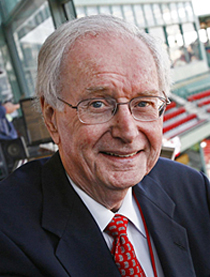
Culture

Flavin
Was Alex Cora robbed when he didn't win the American League Manager of the Year for 2018? It's impossible to conceive of anyone doing a better job than Cora did this year: 108 wins is an all-time record for a Red Sox team. His managing during the post-season was flawless, with 11 wins against only three losses, and a World Series championship, although the voting is done before the playoffs begin. But was he robbed?
Bob Melvin of the Oakland A's, the eventual winner, had a team with the lowest payroll in baseball at the season's start ($68.6 million); a team that finished last in the American League West in 2017; a team that in June of this year had an 11-game deficit to make up for the wild card berth; and he led it to the post-season with a record of 97 and 65. That's nothing to sneeze at, so it's hard to say who deserved it more. I think Cora earned it because the object of the game is to win, and that's exactly what the Red Sox skipper did. But it wasn't an out and out hijacking.
It's not the first time that a Red Sox skipper has been denied the honor that should rightfully have been his. Terry Francona, the most successful manager in the team's history, never won a Manager of the Year Award while he was with the Sox. He did win in 2016 with the Indians.
If Cora wasn't exactly robbed in 2018, Pedro Martinez was robbed in 1999. He was edged out for Most Valuable Player by Ivan Rodriguez because two members of the Baseball Writers of America, who do the voting on these things, left him totally off their ballots -- and they get to choose up to ten players each. George King of the New York Post and Lavelle Neal of the Minneapolis Star-Tribune were apparently under the impression that pitchers are not players and thus shouldn't be considered for an MVP award. Rodriguez was a terrific player and had an outstanding year in '99, but he did not lead the league in a single offensive category. Pedro, on the other hand, won the pitching Triple Crown that year, leading the league in victories (23-4), earned run average (2.04) and strike outs (313). But, as Neal, one of the robbers, said, "It was nothing personal against Pedro."
With Ted Williams, though, it was personal. Ted was robbed, virtually at gunpoint, of the MVP award a number of times, and it was because a lot of the voting writers just plain didn't like him. He was edged out by a single vote in 1947 when one writer reportedly didn't include him as one of the top ten players in the league and Ted had won the Triple Crown that year. The winner was Joe DiMaggio, whom Williams had out hit (.343 versus .315), out homered (32 versus 20), and out RBI'd (114 versus 97). Williams believed that the writer who didn't even give him a tenth-place vote (which would have been enough to put him over the top) was Mel Webb of The Boston Globe, but Webb was almost certainly not the guilty party. He was an old-timer in his 70s by then, didn't write on baseball regularly anymore, and he was not one of the voters in either 1946, when Ted did win the MVP, or in 1948.
The 1947 robbery, bad as it was, was not as outrageous as 1942, when Williams also won the Triple Crown but lost in the voting to Yankee second baseman Joe Gordon. The discrepancy in numbers was even wider than in 1947; batting average, .356 to Gordon's .322, home runs, 36 to 18, and runs batted in, 142 to 113.
Those brazen stick-ups were in addition to 1941, when he lost out as MVP despite batting .406 and leading the league in home runs; and again in 1957 when, at age 39, he was passed over in spite of batting .388.
Clearly, some of the writers voting in those elections did not like Ted very much. Just as clearly, he had given them ample reason not to like him. He was a high strung guy with a hair-trigger temper that he struggled to control all his life; and he really had no family life as a child and had not been taught how to deal with adversity. When he was criticized in print he lashed out, sometimes at any writer who happened to be around. That didn't win him any popularity contests with those who wrote about him -- and who voted on who would win awards. Let's just say that their relationship was adversarial.
As the years went by and Ted mellowed, things got a little better between them. In 1969, the writers voted him American League Manager of the Year when he led the expansion Washington Senators to a third-place finish. He'd had a pretty good year, though it was hardly of Triple Crown caliber.
In an effort to rectify the questionable choices sometimes made by the writers, the task of choosing Gold Glove winners was turned over to managers and coaches. Who could be more qualified and more relied upon to make worthy choices, right? In 1999, the managers and coaches, in their unquestioned wisdom, awarded the Gold Glove for first basemen to Rafael Palmeiro, who had played only 28 games at first base in that entire season. So much for baseball's fool-proof decision making process.
It turns out that managers and coaches, just like baseball writers, are people, too. And people sometimes make mistakes. When choosing the recipients of high honors they can be right more often than they are wrong, though at times those choices can be called into question. And every once in a while they can be wildly off the mark.
You know, just like in presidential elections.
- Dick Flavin is a New York Times bestselling author; the Boston Red Sox “Poet Laureate” and The Pilot’s recently minted Sports’ columnist.
Recent articles in the Culture & Events section
-
Happy New Year!Eileen McLaughlin
-
Joyful hopeMichael Reardon
-
Scripture Reflection for Jan. 5, 2025, The Epiphany of the LordDeacon Greg Kandra
-
Tolkien's world, still popular on the big screen, began with faith and wordsCecilia Hadley
-
Scripture Reflection for Dec. 22, 2024, Fourth Sunday of AdventDeacon Greg Kandra























